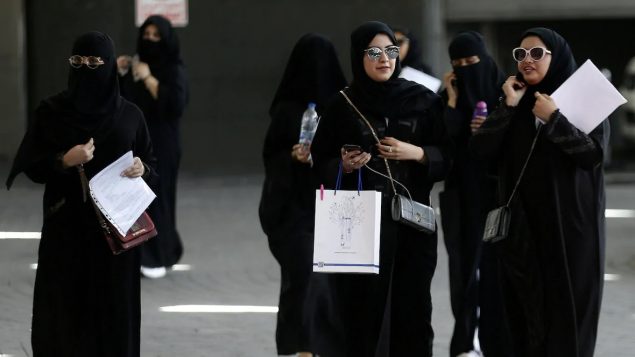Amnesty International is calling changes to Saudi Arabia’s male guardian system announced last Friday both “important” and “bittersweet.”
Under the new laws, which was marked by some praise and some celebration, Saudi women will now be able to apply for a transport and travel freely when the changes take effect at the end of the month.
Other changes allow women to register a marriage, a divorce or a child’s birth, be issued official family documents and permit mothers to be a legal guardian of her child.

New Saudi Arabian laws allow women to travel without male consent. (Faisal al Nasser, File/Reuters)
The changes came a little over 13 months after women were permitted to drive.
That’s the good news.
The bad news: at least a dozen women, including Loujain al-Hathloul who has strong ties to Canada, remain in prison, and an unknown number of others still face charges, stemming from their active pursuit of human rights in the kingdom.
More bad news: rules that require male consent for a woman to leave prison, exit a domestic abuse shelter or marry remain in place.

Al-Hathloul attended the University of British Columbia between 2009 and 2013, graduating with a degree in French. Despite reforms announced by Saudi Arabia last week, she and other activists remain in prison. (Facebook)
And, unlike men, women are still not allowed to pass on citizenship to their children and cannot provide consent for their children to marry.
Some Saudi women said they had to hack into their guardian’s phone to alter the settings on a government app that would allow them to exit the country.
In January 18-year-old Rahaf Mohammed al-Qunun drew international attention when she live-tweeted an asylum plea from a Bangkok after she fled her Saudi family drew global attention.
Qunun eventually sought–and was granted–asylum in Canada, but the Saudi embassy in Bangkok faced global criticism for allegedly attempting to repatriate her to the kingdom against her will.

Jacqueline Hansen is Amnesty International Canada’s Major Campaigns and Women’s Rights Campaigner. Her work covers a wide range of human rights concerns in Canada and internationally. (Courtesy: Amnesty International Canada)
For some perspective on what happened last week, I spoke by phone Monday with Jacqueline Hansen.
She is Amnesty International Canada’s Major Campaigns and Women’s Rights Campaigner.
Listen






For reasons beyond our control, and for an undetermined period of time, our comment section is now closed. However, our social networks remain open to your contributions.